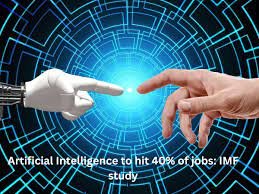
In recent scrutiny, the International Monetary Fund (IMF) has cast apprehensions regarding the far-reaching implications of Artificial Intelligence (AI) on the global employment landscape. The report posits that AI looms to impact nearly 41% of all vocations, potentially unsettling income disparities and the overall equilibrium of global economies.
The Pervasive Reach of AI
Delving into the IMF’s analysis, predicated on an exhaustive examination of emerging patterns, unveils AI’s not only substitutive but also supplementary role across diverse professional domains. This revelation has ignited conversations surrounding the extent of this metamorphosis and the imperative for preemptive measures to alleviate plausible adversities.
Global Employment Upheaval
The IMF’s prognostications are disconcerting, envisaging a scenario where 41% of occupations spanning various sectors confront upheaval due to AI. This perturbation is anticipated to be more pronounced in advanced economies, where automation and AI technologies hold greater sway.
The study underscores the pivotal role AI is slated to play in the metamorphosis of the global economy. Positions ranging from manual and routine tasks to intricate, high-skilled roles are poised to be affected, prompting inquiries about the adaptability of the extant workforce to the unfolding technological panorama.
Exacerbated Inequality
A significant apprehension emanating from the IMF’s analysis is the conceivable amplification of income inequality. The report intimates that advanced economies, while grappling with higher rates of job displacement, might also witness an intensification of wealth gaps among distinct segments of the populace.
The IMF underscores the significance of addressing these disparages and implementing policies that assure an equitable distribution of AI’s benefits. Absent targeted interventions, the ascendance of AI could widen extant economic inequalities, further marginalizing susceptible populations.
Policy Imperatives

Acknowledging the ineluctability of AI’s impact on the labor market, the IMF advocates for a meticulous equilibrium of policies to adeptly navigate this transition. Policymakers are enjoined to contemplate measures fostering job creation in nascent sectors, reskilling programs to equip the workforce for novel roles, and social safety nets to buttress those adversely affected.
The report accentuates the pivotal roles governments, enterprises, and educational institutions play in a concerted effort to navigate the challenges posed by AI. Proactive policy responses, as per the IMF, are imperative in sculpting a future where the advantages of AI are harnessed without forsaking segments of the populace.
Global Perspectives on AI Disruption
As the word of the IMF’s caution permeates, sundry stakeholders articulate their perspectives on the ramifications of widespread AI disruption. Pioneers in the technology sector perceive AI as a catalyzing force for innovation and efficiency but acknowledge the need for judicious deployment and consideration of societal repercussions.
Labor unions and advocates for workers’ rights clamor for a concerted endeavor to ensure that the benefits of AI aren’t concentrated within an elite echelon. They underscore the significance of negotiating equitable terms for workers, encompassing safeguards against unjust job displacement and mechanisms for upskilling and reskilling.
Economic Forecast Amidst AI Uncertainty, According to IMF
The IMF’s admonition arrives amid a juncture of global economic ambiguity, with nations grappling with the repercussions of the COVID-19 pandemic. The convergence of AI disruption with prevailing economic quandaries introduces additional intricacies for policymakers seeking a course to recovery.
Economists are vigilantly monitoring how governments respond to the IMF’s counsel and execute policies to grapple with the multifaceted challenges presented by AI. The delicate equilibrium between technological advancement and societal impact pervades contemporary economic deliberations.
Looking Ahead: Managing AI’s Impact Responsibly
As the global community confronts the realities of AI-induced job turmoil, the onus lies in formulating strategies that exploit the advantages of technology while safeguarding the welfare of individuals and societies.
Key stakeholders—encompassing governments, enterprises, and educational institutions—must collaborate to engender an environment where AI is deployed responsibly. This entails investing in educational and training initiatives, nurturing innovation that begets new employment avenues, and instituting social policies guaranteeing the equitable dispensation of AI’s advantages.
The IMF’s warning acts as a timely reminder that the future of work is undergoing rapid evolution, necessitating proactive measures to sculpt a future where AI contributes to economic growth without exacerbating societal schisms. In grappling with the challenges ahead, policymakers and industry leaders must coalesce to construct a resilient and all-encompassing global economy, harnessing the power of AI for the benefit of all.
Conclusion

The IMF’s admonitory stance on the ramifications of AI on jobs and inequality underscores the urgency of a coordinated and forward-looking approach. As AI continues to reshape the global economy, it is imperative to prioritize policies ensuring an equitable and inclusive transition. The subtle equilibrium between technological progress and societal well-being demands thoughtful contemplation and collective efforts on a global scale. In the face of uncertainty, policymakers, businesses, and communities must forge a collaborative path to navigate the challenges and opportunities presented by the ascent of Artificial Intelligence.











Comments 1